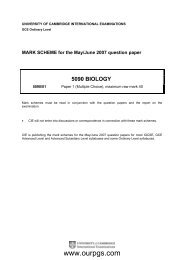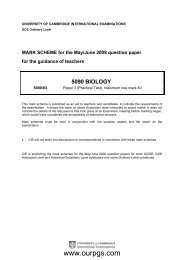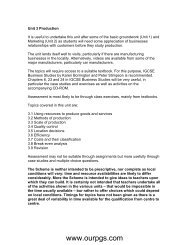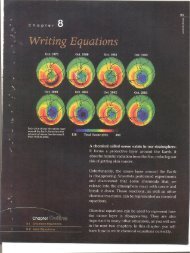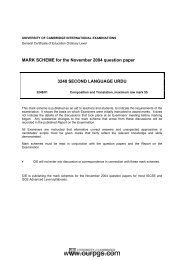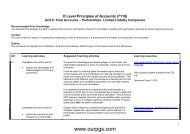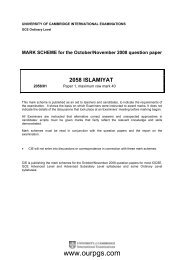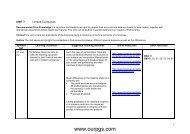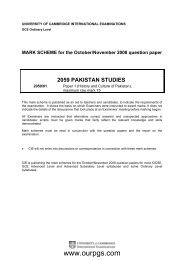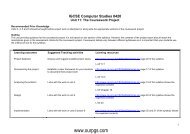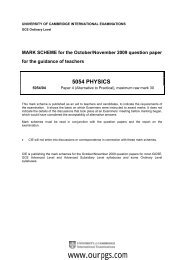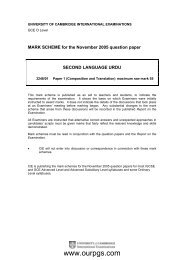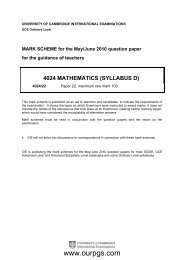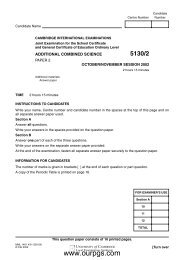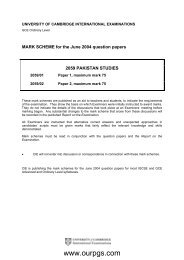COMPUTER STUDIES 0420 <strong>IGCSE</strong> 2009SECTION 3Problem solution including algorithm design and programming conceptsThe aim of this section of the syllabus is to cover the design, development, implementation,maintenance and review principles, which include techniques and tools which relate to the solutionto a problem. A study of these topics is reinforced through practical work and illustrated by aconsideration of existing problem solutions in <strong>com</strong>puter applications.3.1 Making an overall plan. Most of this work is encountered through practical exercises.Defining the scope of separatemodulesDesigning algorithms which relateclearly to the requirements of thesystemExplaining algorithms and howthey relate to the systemExplaining how hardware needsarise from the output requiredfrom the systemAlgorithm toolsInterpreting and testingalgorithmsTop-down design, structure diagrams, flowcharts, menus,libraries of procedures and subroutines.Candidates should be able to work out the purpose of analgorithm, perhaps with the help of a dry run, and to suggest andapply suitable test data. Candidates should be able to identifyerrors in given algorithms and suggest ways of removing theseerrors.3.2 Candidates should have experience of representing algorithms informally (as structurediagrams, flowcharts, step sequences, descriptions) and more formally in pseudocode.Candidates should appreciate the main requirements of a programming language, to allowmanipulation of data of various types and structures, including control of input and output, and toprovide for selection, repetition and subprogram inter<strong>com</strong>munication. Candidates should have asimple understanding of the functions of interpreters, <strong>com</strong>pilers and assemblers, and anappreciation of the benefits offered by the existence of a range of languages, both high and lowlevel.The concept of a programHigh-level languagesLow-level languagesPseudocode structuresDocumentationUser documentation, technicaldocumentationCandidates will not be expected to code in any particularlanguage but they should be familiar with the concepts ofsequence, selection and repetition.Repeat ... Until.If ... Then ... Else ... Endif.Case of ... ... ... Otherwise ... Endcase.While ... Do ... Endwhile.For … Do / For to … … nextCandidates should be able to distinguish between thedocumentation required by users and that required by thoseresponsible for improving and maintaining a solution in workingorder or for developing the solution to meet new needs.10www.ourpgs.<strong>com</strong>
COMPUTER STUDIES 0420 <strong>IGCSE</strong> 2009SECTION 4Generic software and the organisation of dataThe aim of this section is to acquaint the candidates with a broad view of generic softwarepackages. It is expected that these will be experienced through practical work. Althoughcandidates may choose to be<strong>com</strong>e expert in the use of a particular package, only a generalknowledge is required of the kinds of features typical of generic packages.4.1 Software for word-processing,database management, spreadsheets,graphics, <strong>com</strong>munications, multimedia,data-logging, CAD programming,desktop publishing and web designHow applications packages solve setsof standard problems. Typicalproblems capable of solution bypackages. Use of standardtechniques or routines for establishedforms of processing (for example, fileprocessing, sorting, simulation)Candidates should appreciate ways, including import andexport, of using programming, desktop publishing, wordprocessingpackages, spreadsheets, databases, graphicspackages, information retrieval packages, and show anunderstanding of the use of graphical user interfaces,<strong>com</strong>munications software (including email), web browsersand search engines and authoring packages. They shouldappreciate the virtues and disadvantages of integratedpackages, and of generic packages <strong>com</strong>pared withspecially written software and how packages may becustomised by the use of macros. They should be able toexplain the use of the tools associated with data-logging.4.2 DataCandidates should be aware of the standard methods of data collection, verification and validation,and where it is appropriate to use particular methods.Candidates should understand that data, particularly data held in files, requires access in differentways depending on the particular application. The medium on which the data is stored, andparticularly the way in which it is organised, depend on the requirements for access. Candidatesshould be familiar with the idea of file ordering and the principles of sorting and merging. Theyshould have experience of sequential file processing and of processing individual records bymeans of record keys.The relationship between informationand data; the collection of data;methods of ensuring its correctness(including validation and verificationand the distinction between these); thecoding of data for input; thepresentation of useful information fromprocessed data; analogue-to-digitaland digital-to-analogue conversionsFile organisation: different forms oforganisation, depending on the datastored and the requirements forprocessing; processing methodsData types: numbers, characters,strings, arrays, the need for differentdata types and structures to representthe data of problems which are beingsolved using a <strong>com</strong>puterCandidates should be able to describe and select methodsof automatic data capture in a number of applications.Candidates should be able to describe methods of datacollection, verification, validation and presentation, and giveexamples of analogue-to-digital and digital-to-analogueconversion.Candidates should be able to select and justify appropriatemethods of data collection, verification, validation andpresentation, and assess the use of physical variables suchas temperature and pressure to control processingactivities.Candidates should be able to describe the need for and thesimple processing of files, and select with reasonsappropriate file organisation and processing methods for aparticular application, and understand routines used for filemaintenance such as updates, insertions and deletions.Candidates should be able to identify the different forms ofdata and representations for processing which relate to agiven simple problem, and explain the need for differentdata types and structures and how these relate to the dataof a given problem.11www.ourpgs.<strong>com</strong>



